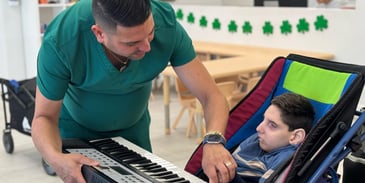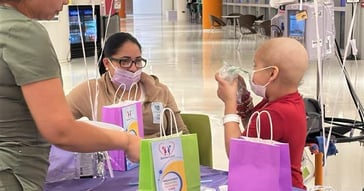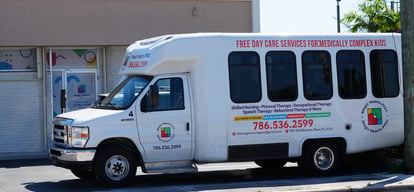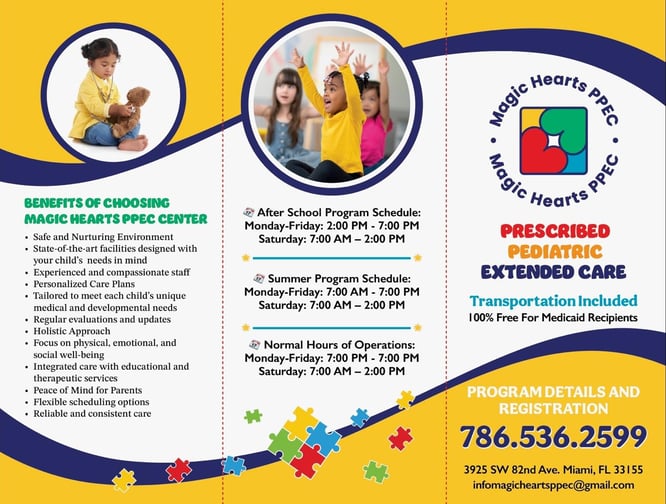Expert Care Solutions
Dedicated nursing care and therapies for children with complex medical needs in a safe environment.




Therapeutic Services
Tailored therapy programs focusing on developmental support and essential skills for medically fragile children.
Skilled Nursing Care
Compassionate nursing staff providing specialized care to ensure comfort and health throughout the day.


PPEC
Serve children with medically complex and fragile medical needs. Our staff is expressly trained to meet the unique needs of children with severe physical disabilities, diseases, syndromes, and neurological impairments, from newborn to age 21


Free Transportation Services
NEMT (Non-Emergency Medical Transportation) is designed to help children with complex medical needs get to and from school safely. Our dedicated team understands the unique challenges these children face, and we provide reliable daily transportation services to ensure they arrive at school on time and return home safely. With our own fleet of specially equipped vehicles, we guarantee comfort and care during each ride. Our trained drivers are compassionate and attentive, ensuring that your child's specific needs are met throughout the journey.


Educational Programs
We provide an enriching environment where learning is a joyful journey led by our dedicated educators. Our diverse array of interactive learning modules is designed to encourage growth and engagement through daily activities. Whether children are exploring the wonders of nature outdoors, taking part in creative indoor events, or expressing themselves through arts and crafts, education remains at the heart of their experience. We emphasize the importance of cognitive, emotional, language, physical, and social development in all facets of their lives.
Pediatric Prescribed Extended Care (PPEC)
Pediatric Prescribed Extended Care (PPEC)Serve children with medically complex and fragile medical needs. Our staff is expressly trained to meet the unique needs of children with severe physical disabilities, diseases, syndromes, and neurological impairments, from newborn to age 21.
PPEC, or Pediatric Prescribed Extended Care, is a crucial healthcare service designed to provide specialized care and support for medically fragile children. The importance of PPEC lies in its ability to offer a lifeline to families facing the complex and demanding needs of children with chronic illnesses or disabilities. PPEC centers play a pivotal role in ensuring that these children receive the medical attention, therapy, and education required to improve their quality of life and promote their overall development. The process of PPEC involves a multidisciplinary approach, encompassing skilled nursing care, physical and occupational therapy, and educational services tailored to each child's specific needs. These centers work closely with families and medical professionals to create individualized care plans, monitor progress, and ensure a safe and nurturing environment for the children. PPEC not only enhances the well-being of medically fragile children but also alleviates the emotional and logistical burdens on their families, making it an indispensable component of pediatric healthcare.


Skilled Nursing
At Magic Hearts PPEC facility, skilled nursing plays a crucial role in providing high-quality, compassionate care for our young patients. Our dedicated team comprises a variety of licensed healthcare professionals, including a medical director who oversees all aspects of care, and a director of nursing who ensures that clinical practices meet the highest standards. Registered nurses (RNs) and licensed practical nurses (LPNs) work collaboratively to deliver personalized care, administering medications, performing medical procedures, and monitoring patients' progress. Additionally, our certified nursing assistants (CNAs) provide essential support by assisting with daily living activities and fostering a nurturing environment. This comprehensive approach enables us to cater to each child's unique needs, ensuring their health and comfort while they receive innovative therapies in a safe and caring setting. Together, our skilled nursing staff exemplifies the commitment to excellence that defines Magic Hearts PPEC Center.
Skilled nursing services play a vital role in PPEC center, offering specialized care, expertise, and support to patients with complex medical needs. The importance of skilled nursing lies in its capacity to bridge the gap between hospital care and the PPEC facility. Skilled nurses provide professional, personalized care, ensuring that patients recovering from surgery, managing chronic conditions, or dealing with various health challenges receive the necessary medical attention, monitoring, and assistance. They also play a pivotal role in educating patients and their families on managing their conditions, medications, and lifestyle choices. The process of skilled nursing involves comprehensive assessments, continuous monitoring, administering medications, wound care, and helping patients regain independence in their daily lives. Skilled nurses collaborate with other healthcare professionals to create holistic care plans that promote patients' recovery and well-being.
Free door to door Transportation (NEMT)
At Magic Hearts, we pride ourselves on providing exceptional transportation services with our own NEMT (Non-Emergency Medical Transportation) Wheelchair SAFE fleet. Our dedicated team ensures that your child is picked up from either home or school and safely transported to our center. We understand the importance of timely arrivals, so we prioritize punctuality in every trip. During the journey, our trained professionals are on board to offer medical care as needed, ensuring your child's safety and well-being at all times. After their time at our center, we make sure to return them back home promptly, making the entire process seamless and stress-free for families. Your child's health and comfort are our top priorities, and we are committed to providing reliable and safe transportation.


Therapies
Occupational Therapy
Occupational therapy provided within a Pediatric Prescribed Extended Care (PPEC) center is of paramount importance as it serves as a crucial component of comprehensive care for medically fragile children. These services are instrumental in addressing the unique developmental, sensory, and cognitive needs of children with chronic illnesses or disabilities, helping them achieve greater independence and quality of life. Occupational therapists within a PPEC center work closely with these young patients to develop personalized interventions that enhance their ability to perform daily activities, engage with their environment, and cultivate essential life skills. The process involves comprehensive assessments, individualized treatment plans, and a wide range of therapeutic activities that focus on improving fine motor skills, sensory processing, and cognitive functions. By promoting these essential life skills, reducing barriers to participation, and fostering independence, occupational therapy in a PPEC center plays a pivotal role in helping medically fragile children reach their maximum potential and ensuring their holistic development and well-being.
Speech Therapy
Speech therapy services within a Pediatric Prescribed Extended Care (PPEC) center hold significant importance as they are essential for the holistic development and well-being of medically fragile children facing speech and language challenges. These services play a pivotal role in helping these children overcome communication difficulties, which can impact their quality of life and ability to engage with the world. Speech therapists within a PPEC center work closely with each child to assess their unique speech and language needs and develop personalized treatment plans. The process involves a range of therapeutic techniques and exercises aimed at improving speech articulation, language comprehension, social communication skills, and cognitive development. By addressing these vital aspects, speech therapy empowers children to express themselves, connect with others, and access educational opportunities, ultimately enhancing their overall development and improving their prospects for a fulfilling life. In doing so, speech therapy in a PPEC center is an indispensable component of comprehensive care, ensuring that medically fragile children can reach their communication potential and participate more fully in their communities.
Respiratory Therapy
Respiratory therapy services within a Pediatric Prescribed Extended Care (PPEC) center are of paramount importance, serving as a lifeline for medically fragile children with complex respiratory conditions. These services play a critical role in addressing the unique respiratory needs of these young patients, ensuring their ability to breathe comfortably and effectively. Respiratory therapists within a PPEC center work closely with children to assess their respiratory function, provide expert care, and develop individualized treatment plans. The process includes interventions such as oxygen therapy, airway clearance techniques, ventilator management, and education on respiratory health. By optimizing respiratory function and preventing complications, respiratory therapy enhances the quality of life for medically fragile children and reduces the risk of respiratory-related emergencies. These services are indispensable in the overall care of such children, promoting their well-being, development, and ensuring they can lead as healthy and fulfilling lives as possible.
Behavioral Therapy (ABA)
Behavioral therapy services within a Pediatric Prescribed Extended Care (PPEC) center are of utmost importance in supporting the holistic well-being and development of medically fragile children with behavioral challenges. These services play a crucial role in addressing and managing a range of behavioral and emotional difficulties, helping children develop coping mechanisms, social skills, and emotional regulation. Behavioral therapists within a PPEC center work closely with each child to conduct comprehensive assessments and design personalized intervention plans that focus on addressing specific behavioral issues. The process involves implementing evidence-based strategies, such as cognitive-behavioral techniques, play therapy, and positive reinforcement, to promote positive behavioral changes and improve the child's overall emotional and social functioning. By fostering healthier behavioral patterns and enhancing social interactions, behavioral therapy in a PPEC center not only improves the child's quality of life but also contributes to creating a nurturing and supportive environment that encourages their overall development and well-being.
Social Therapeutic Activities
Social therapeutic activities in a Pediatric Prescribed Extended Care (PPEC) center are of significant importance as they serve as a vital component in enhancing the emotional and social well-being of medically fragile children. These activities play a crucial role in providing children with opportunities to engage with their peers, express themselves, and develop essential social and emotional skills, all of which contribute to their overall quality of life. The process involves planning and facilitating group activities that are tailored to the individual needs and interests of the children, allowing them to interact, communicate, and build connections in a supportive and inclusive environment. Social therapeutic activities often include art, music, play, and recreational therapies, as well as group discussions and outings. By participating in these activities, children can develop self-confidence, build friendships, and gain a sense of belonging, which is vital for their emotional and social development. In a PPEC center, social therapeutic activities complement the medical and therapeutic services, ensuring that children receive comprehensive care that fosters their overall well-being and quality of life.
Socialization Skills
Socialization skills through arts and crafts activities in a Pediatric Prescribed Extended Care (PPEC) center are of profound importance as they provide medically fragile children with a platform to develop essential social, creative, and fine motor skills. These activities play a vital role in fostering a sense of belonging and interaction among the children, often facing various health challenges, and promoting their emotional well-being. The process involves organizing and supervising arts and crafts sessions where children can collaborate on creative projects, express themselves, and engage in teamwork. These activities not only enhance their artistic and fine motor skills but also offer opportunities for socialization, building friendships, and boosting self-esteem. In a supportive and nurturing environment, children can share their experiences, inspire one another, and develop socialization skills that are crucial for their emotional and social development. Socialization skills through arts and crafts complement the comprehensive care provided in a PPEC center, ensuring that children receive holistic support that enriches their lives and helps them overcome the challenges they face.
Physical Therapy
Physical therapy within a Pediatric Prescribed Extended Care (PPEC) center holds immense importance as it plays a pivotal role in the comprehensive care and development of medically fragile children. These services are essential in addressing the unique physical challenges and therapeutic needs of children with chronic illnesses or disabilities. Physical therapists within a PPEC center work closely with these young patients to enhance their mobility, strength, and overall physical function. Through tailored assessments and individualized treatment plans, physical therapy helps children reach their maximum potential, improve their quality of life, and foster greater independence. The process involves a combination of exercises, techniques, and interventions that aid in the rehabilitation of musculoskeletal issues, as well as in the management of pain and discomfort. By promoting physical well-being, reducing the risk of complications, and optimizing mobility, physical therapy in a PPEC center is an indispensable component in the holistic care of medically fragile children, ensuring their overall development and improved health outcomes.
Magic Hearts Pediatric Prescribed Extended Care (PPEC)
Specialized nursing for medically fragile children.
3925 SW 82nd Ave
Miami, FL 33155
Contact us
786-536-2599
© 2025 Magic Hearts PPEC. All rights reserved.
Hours of Operation
Monday - Friday: 7am to 7pm
Saturdays: 7am to 2pm